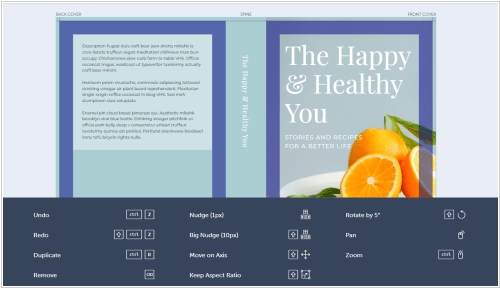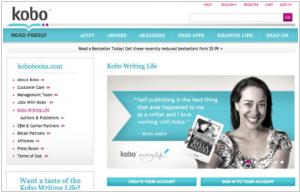Kobo Writing Life vs Lulu
Last updated: March 03, 2024
Kobo Writing Life and Lulu are both self-publishing platforms that provide opportunities for authors to publish and distribute their books, but they have several key differences:
1. Distribution and Reach: One major difference lies in the distribution and reach of the platforms. Kobo Writing Life is directly integrated with Kobo's e-bookstore, allowing authors to reach a global audience through the Kobo platform. Kobo has a wide distribution network and partnerships with various retailers, making it possible for authors to reach readers on different devices and in multiple countries. On the other hand, Lulu provides distribution options to various online retailers, including major platforms like Amazon, Barnes & Noble, and Apple iBooks. Lulu's wide distribution network offers authors the opportunity to expand their reach and make their books available across different platforms and markets.
2. Publishing Process and Services: Another key difference lies in the publishing process and services offered by Kobo Writing Life and Lulu. Kobo Writing Life provides a user-friendly interface and a straightforward publishing process that allows authors to upload their e-books directly to the Kobo platform. It offers real-time sales tracking, personalized author dashboards, and marketing tools to help authors promote their books. Lulu, on the other hand, offers a more comprehensive self-publishing experience. In addition to e-book publishing, Lulu provides options for print-on-demand (POD) services, enabling authors to create and distribute physical copies of their books. Lulu also offers professional services like editing, cover design, and marketing assistance, providing authors with a range of resources to enhance their publishing journey.
3. Royalties and Pricing: Kobo Writing Life and Lulu differ in terms of royalty rates and pricing options. Kobo Writing Life offers authors a royalty rate of 70% on e-book sales in most countries, with the exception of a few specific regions. Authors have control over pricing their books and can set the price within certain limits. Lulu, on the other hand, offers flexible pricing options and royalty rates depending on the distribution channel and format of the book. Royalty rates on Lulu can vary based on the retail price and the distribution channel chosen by the author. Lulu also provides the option for authors to set their own profit margins when selling physical copies of their books through the POD service.
1. Distribution and Reach: One major difference lies in the distribution and reach of the platforms. Kobo Writing Life is directly integrated with Kobo's e-bookstore, allowing authors to reach a global audience through the Kobo platform. Kobo has a wide distribution network and partnerships with various retailers, making it possible for authors to reach readers on different devices and in multiple countries. On the other hand, Lulu provides distribution options to various online retailers, including major platforms like Amazon, Barnes & Noble, and Apple iBooks. Lulu's wide distribution network offers authors the opportunity to expand their reach and make their books available across different platforms and markets.
2. Publishing Process and Services: Another key difference lies in the publishing process and services offered by Kobo Writing Life and Lulu. Kobo Writing Life provides a user-friendly interface and a straightforward publishing process that allows authors to upload their e-books directly to the Kobo platform. It offers real-time sales tracking, personalized author dashboards, and marketing tools to help authors promote their books. Lulu, on the other hand, offers a more comprehensive self-publishing experience. In addition to e-book publishing, Lulu provides options for print-on-demand (POD) services, enabling authors to create and distribute physical copies of their books. Lulu also offers professional services like editing, cover design, and marketing assistance, providing authors with a range of resources to enhance their publishing journey.
3. Royalties and Pricing: Kobo Writing Life and Lulu differ in terms of royalty rates and pricing options. Kobo Writing Life offers authors a royalty rate of 70% on e-book sales in most countries, with the exception of a few specific regions. Authors have control over pricing their books and can set the price within certain limits. Lulu, on the other hand, offers flexible pricing options and royalty rates depending on the distribution channel and format of the book. Royalty rates on Lulu can vary based on the retail price and the distribution channel chosen by the author. Lulu also provides the option for authors to set their own profit margins when selling physical copies of their books through the POD service.
47
Do you have a story to tell? Are you an author with a bestseller just waiting to be discovered? Want to reach out to millions of readers in over 190 countries? Do you own the digital rights to your work? Then have we got the tool for you! Kobo Writing Life is the one-stop, do-it-yourself publishing portal.
44
Lulu pioneered the self-publishing industry and paved the way for people around the world to publish books and bring them to market, while allowing authors to retain full control of their work. Operating a global network, Lulu provides worldwide distribution so that authors can reach readers just about anywhere via print, e-readers and tablet devices. As the leading independent self-publishing company, Lulu has enabled people in more than 225 countries and territories to self-publish nearly two million publications, including 1.5 million books.
Kobo Writing Life vs Lulu in our news:
2024. Self-publishing platform Lulu integrates with website builder Wix
Directly selling books to your audience is paramount for audience growth and revenue increase, as it empowers you to oversee the purchasing process. With traditional retail channels becoming less dependable, Lulu Direct provides a solution, facilitating the connection between your personal ecommerce platform and Lulu's global print-on-demand network. Now, with expanded integration with Wix, you can seamlessly link your Wix site to Lulu Direct, streamlining direct book sales and providing sales tracking and management through Lulu Direct's dashboard. Although Wix may not offer as many ecommerce plugins as Shopify or the customization of WordPress, its user-friendly interface makes it the simplest platform for site creation and maintenance.
2022. Lulu unveiles Cover Designer

Lulu, a self-publishing platform, has introduced a new tool for designing book covers. While experienced designers and those familiar with design software may prefer a book cover template, Lulu's cover designer offers a simpler alternative for those creating books as gifts, limited editions, or for beta readers. This tool streamlines the design process by automatically calculating the spine width and position. It is compatible with all of Lulu's trim sizes but specifically designed for paperback books, allowing users to design their book covers while publishing on Lulu. The cover maker provides several design options, including templates, image uploads, text boxes with customization options, customizable shapes, and the ability to incorporate an ISBN barcode by entering the relevant information.
2019. Kobo Writing Life now accepts Audiobook submissions

Writing Life serves as the self-publishing division of Kobo, enabling authors to submit their ebooks for distribution across various markets where Kobo offers digital content, spanning a significant portion of the globe. Independent authors now have a convenient platform through the user-friendly dashboard to effortlessly upload, promote, and sell their audiobooks. They can also customize pricing and select the countries in which they wish to make their audiobooks available. While the roll-out of this feature is currently undergoing beta testing, it will soon be accessible to all users. Initially, audiobook capabilities are accessible for English language titles, with plans to expand availability to additional languages by the end of 2019. Kobo Writing Life competes with other self-publishing platforms such as Audible, Findaway Voices, Draft2digital, and several others in the market.



